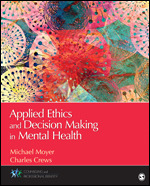Applied Ethics and Decision Making in Mental Health
- Michael Moyer - University of Texas, San Antonio, USA
- Charles Crews - Texas Tech University, USA
–Kristi Gibbs, University of Tennessee at Chattanooga
Applied Ethics and Decision Making in Mental Health covers professional issues and ethical decision making related to the codes of ethics of the American Counseling Association, the American Psychological Association, and the American Association for Marriage and Family Therapy in an easy-to-read format, connecting ethical standards to real-life scenarios. This book not only focuses on the various aspects of legal issues and codes of ethics, but also includes ethical decision making models and exploration into the philosophy behind ethical decision making. By challenging readers to understand their own morals, values, and beliefs, this in-depth guide encourages critical thinking, real world application, and classroom discussion using case illustrations, exercises, and examples of real dialogue in every chapter.
“This text is unique in that it provides a comprehensive look at the importance of decision-making models when preparing students to face real-world ethical dilemmas.”
“Moyer and Crews move beyond simply presenting and explaining the ethical code. In this book, they challenge counselors-in-training to grapple with their own values and understand how ethical decision-making is influenced by the lens through which they see the world as much as it is influenced by the actual code.”
“This text offers examination of the current ethical code with emphasis on practical application. It challenges counselors-in-training to examine their personal value systems and the influence this has on becoming and being an ethical counselor.”
“This text uses extensive case illustrations of ethical dilemmas with in-depth discussions regarding how they might be handled. It clearly demonstrates the use of ethical decision making processes which will be a real asset to graduate students in understanding how to maintain an ethical practice. Students will enjoy this text because it is clear, concise, relevant and practical.”


